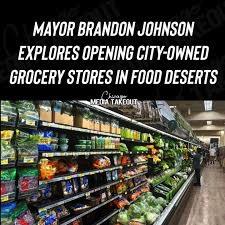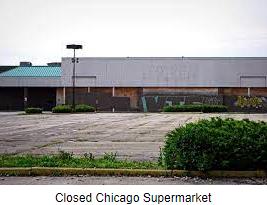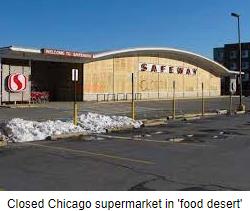 Mayor Brandon Johnson is considering a joint venture between the City of Chicago and a The Economic Security Project, a non-profit to establish grocery stores in areas currently underserved. This is a bad idea from a business perspective but superficially of benefit to civic politicians. The reason why there are few grocery stores in so-called food deserts is that they are unprofitable mainly due to theft, euphemistically referred to as “shrinkage” and colloquially as the “five-finger discount”. A secondary consideration is security. Both of these issues could be resolved by better technology and policing, benefitting the residents of West Englewood and East Garfield Park where more than half of the residents live more than half a mile from a grocery store.
Mayor Brandon Johnson is considering a joint venture between the City of Chicago and a The Economic Security Project, a non-profit to establish grocery stores in areas currently underserved. This is a bad idea from a business perspective but superficially of benefit to civic politicians. The reason why there are few grocery stores in so-called food deserts is that they are unprofitable mainly due to theft, euphemistically referred to as “shrinkage” and colloquially as the “five-finger discount”. A secondary consideration is security. Both of these issues could be resolved by better technology and policing, benefitting the residents of West Englewood and East Garfield Park where more than half of the residents live more than half a mile from a grocery store.

If the City of Chicago would ensure safety in and around stores stores and if the legal system could ensure a fair operating margin for stores, independents and chains would respond by re-opening stores to customers. This is evidenced by the intention to establish a Save-A-Lot store in the Englewood neighborhood in an abandoned Whole Foods Market location.

While it is acknowledged that grocery stores are an important anchor in communities providing fresh fruit, vegetables and reasonably priced food staples, public sector involvement in retailing is expensive to taxpayers is inefficient and invariably unprofitable. This is evidenced by the high prices and losses incurred by state mandated and operated liquor outlets and other quasi-private sector enterprises.
In addition to appropriate policing and provision of services by the City residents could cooperate by supporting local stores and acting as a united community to suppress theft and vandalism.